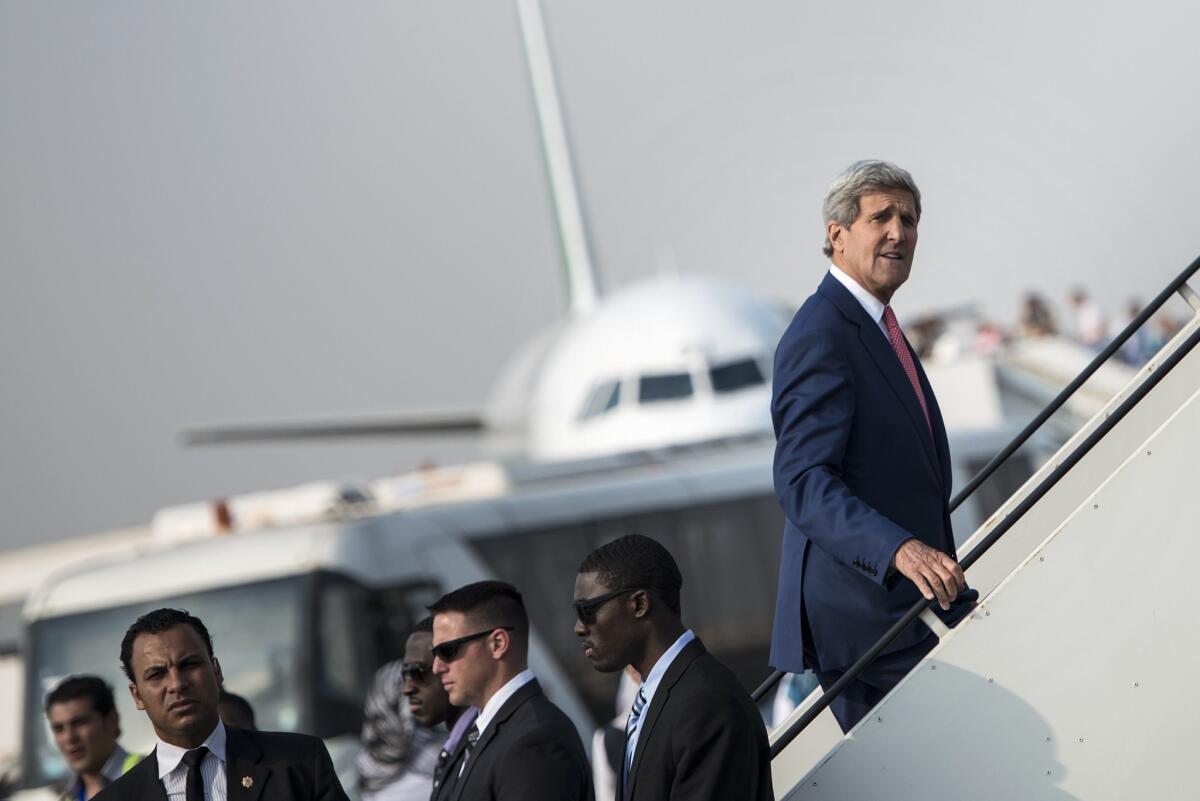Muslim Brotherhood exiles’ exit from Qatar could ease regional quarrel

- Share via
Reporting from Cairo — At least seven officials and clerics associated with Egypt’s Muslim Brotherhood are leaving Qatar, members of the group said Saturday, in a move that could mark an easing of a bitter regional quarrel over the Persian Gulf monarchy’s sheltering of fugitive figures from the Islamist movement.
For more than a year since the Egyptian military removed Islamist President Mohamed Morsi from office, Qatar has offered a haven for many members of his Muslim Brotherhood. It also has called for Morsi’s reinstatement and extended financial support to other Islamist groups, including Hamas.
With nations such as Saudi Arabia and the United Arab Emirates taking Egypt’s side, Qatar had found itself diplomatically isolated in the gulf region, but had maintained the political support of regional power Turkey and its Islamist-leaning government.
Qatar’s move comes as the United States is seeking to assemble a regional coalition to confront the Islamic State, the extremist Sunni Muslim militia that has seized large portions of Syria and Iraq, committing atrocities against Shiite Muslims and ethnic minorities in captured cities and towns. While Qatar does not provide formal support for the Islamic State, it has thus far failed to rein in fundraising for jihadist causes among its wealthy citizenry.
The Brotherhood leaders leaving Qatar were careful not to cast any public blame on the government in Doha for forcing them out. They included Amr Darrag, who was the senior foreign affairs official in the Brotherhood’s now-banned Freedom and Justice Party.
Darrag said in an online statement that he and others were leaving Qatar in order to spare it any “embarrassment” in light of “the circumstances the region is currently facing.” But it was not clear whether Qatar would move against figures such as influential Egyptian-born cleric Yusef Qaradawi, who preaches fiery televised sermons in support of the jihadist cause.
Apart from Qatar, the region’s most Islamist-friendly power is Turkey, and some of the departing Brotherhood members were expected to seek shelter there. Secretary of State John F. Kerry was in Ankara, the Turkish capital, on Friday seeking support for the U.S.-led campaign against the Islamic State. He said it was too early to talk about any specific measures Turkey might take to aid in the fight against the group.
Egypt so far has offered little material support in the U.S. campaign against the Islamic State. In Cairo on Saturday, Kerry suggested that Egypt’s role as an “intellectual and cultural capital” in the region left it well-positioned to denounce the radical ideology espoused by the Islamic State.
Part of Washington’s strategy for drumming up regional opposition to the movement is to recruit prominent religious figures to join in depicting the Sunni Muslim-dominated Islamic State as at odds with the teachings of Islam. Egypt is home to Al Azhar University, Sunni Islam’s highest seat of learning.
The Egyptian government has described the Islamic State as only one of a number of radical movements that pose a threat, including the militant armed factions its forces are battling in the Sinai peninsula. And it considers the Brotherhood a fountainhead of other extremist groups inside and outside Egypt.
Egypt’s crackdown on the Brotherhood in the wake of Morsi’s ouster has left at least 1,400 of the movement’s supporters dead and thousands more imprisoned. Morsi is on trial on a variety of charges, several of which carry the death penalty.
Egyptian enmity toward Qatar is widely viewed as having ensnared three journalists for the English-language arm of the TV news channel Al Jazeera, which is owned by the gulf state. The three, one of them an Australian national, this year were given seven-year prison terms on terrorism-related charges, accused of aiding the Brotherhood.
This month, Egypt — which withdrew its ambassador to Qatar this year — added the accusation of selling secrets to Qatar to the array of charges that Morsi already faced. Saudi Arabia and Bahrain had also withdrawn their envoys to Doha.
Simon Henderson, head of the gulf and energy policy program at The Washington Institute think tank, said Qatar has been trying to play the region’s competing powers against each other because of its precarious geographical position between Sunni-dominated Saudi Arabia and Shiite-led Iran, with which it shares the world’s biggest natural gas field under the Persian Gulf.
“Qatar neither wants to be pro-Saudi nor pro-Iranian,” Henderson said, and as a result has “difficult relations with the Saudis and has cautious relations with Iran.”
Like most gulf states, Qatar is ruled by a hereditary monarchy. But Sheik Tamim bin Hamad al Thani, 34, to whom power was handed last year, appears to be casting the mostly Sunni emirate as a post-feudal society that accepts the Muslim Brotherhood’s belief that all Muslims are equal and sees the Islamist movement as “the way of the future,” Henderson said in a conference call with journalists on Friday.
The trump card held by the tiny gulf state is the giant air base outside the capital, Doha, which is U.S.-run but under Qatari sovereignty, Henderson said. That gives the ruling sheik the power to grant or deny use of the base for air operations over Afghanistan and Iraq and potentially over Syrian areas under Islamic State control.
While Turkey’s Justice and Development Party shares much of the ideology and Islamist tenets of the Muslim Brotherhood, Ankara’s reluctance to actively back the U.S.-led coalition building to confront Islamic State may have more to do with fears for the 49 Turkish diplomats held captive by the militants in the Iraqi city of Mosul, the scholar surmised.
The Turkish consulate was overrun when the Islamic State seized the city in June, and its fighters have held the envoys and staff hostage since.
Times staff writer Carol J. Williams in Los Angeles contributed to this report.
Follow @laurakingLAT on Twitter for news out of the Middle East
More to Read
Sign up for Essential California
The most important California stories and recommendations in your inbox every morning.
You may occasionally receive promotional content from the Los Angeles Times.













